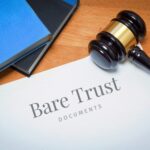
2023 Canada – Saskatchewan Livestock Feed Initiative
November 6, 2023
Late Breaking Bare Trust Reporting Exemption
March 29, 2024New and Expanded Trust Reporting
New rules aimed at providing more transparency on beneficial ownership of assets now require that more trusts file tax returns. The rules became effective in 2023. The new reporting requirements require all trusts, including bare trusts (defined below) to file an information T3 tax return (this include all trust arrangements that have not filed in the past). The new rules also include increased information requirements for those trusts that have already been filing returns.
Bare Trust Arrangements
The rules have been expanded to include cases where a trust acts as an agent for its beneficiaries, commonly known as a bare trust. In such instances, the person/entity listed as the owner of an asset is not the true beneficial owner, instead, they hold the asset on behalf of another party.
Identifying if a Bare Trust Arrangement Exists
To determine if a bare trust arrangement exists, the following question should be asked:
- Is the person on title or holding the asset the true beneficial owner? For example, do they get the benefits of the asset (such as the sale proceeds) and bear the costs or risks of the asset (such as property taxes)?
There is likely a bare trust arrangement if there is a mismatch between legal and beneficial ownership, often requiring a trust return.
There are several reasons why an individual, business or organization may use a bare trust. Many parties involved in a bare trust arrangement may not realize that they are, much less that there may be a filing requirement with CRA. No lawyer may have ever been involved, and no written agreement may have ever been drafted.
Individual Reasons
- a parent is on title of a child’s home (without the parent having beneficial ownership) to assist the child in obtaining a mortgage;
- a parent or grandparent holds an investment or bank account in trust for a child or grandchild;
· one spouse is on title of a house or asset although the other spouse is at least a partial beneficial owner;
· an individual is on legal title to farmland that is beneficially owned by his/her company (the land is reported in the company as an asset)
Estate Planning Reasons
- a child is on title of a parent’s home (without the child having beneficial ownership) for probate or estate planning purposes only;
· a child is on parent’s financial accounts (or other assets) to assist with administration after the parent’s passing;
· (These do not include signing authority)
Business Administration Reasons
- a corporate bank account is opened by the shareholders with the corporation being the beneficial owner of the funds;
- a corporation is on title of an individual’s real estate, vehicle or other asset, and vice-versa;
- assets registered to one corporation but beneficially owned by a related corporation;
- use of a nominee corporation for real estate development purposes;
- a joint venture arrangement where the operator holds legal title to development property as an agent for the benefit of other participants;
· a cost-sharing arrangement where a person holds a business bank account, or other assets, to facilitate the arrangement while having no, or only partial, beneficial interest in these shared assets;
· a partner of a partnership holding a bank account or asset for the benefit of all the other partners of a partnership
Industry-specific Issues
- a property management company holding operational bank accounts in trust for their clients, or individuals managing properties for other corporations holding bank accounts for those other corporations; and
· a lawyer’s specific trust account (while a lawyer’s general trust account is largely carved out of the filing requirements, a specific trust account is not).
What does this mean for you?
If you believe you are part of one of these arrangements, please contact our office as soon as possible to discuss your possible filing requirements and the information we will need from you in order to file.
If we are already filing a trust return for your trust you don’t need to do anything further, we’ll contact you if we need more information.
Be aware! Penalties for non-filing
Late filing penalties are to a maximum of $2,500 per year.
Gross negligence penalties for inaccurate or incomplete information are equal to the greater of $2,500 and 5% of the highest fair market value of the trust assets during the year.


